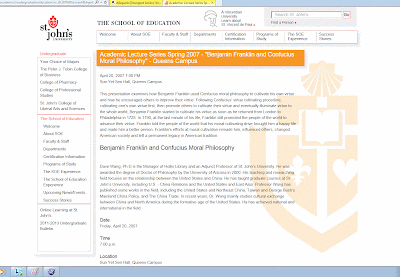Seventeen years after Benjamin Franklin stated that Confucius was his example, Dr. Ezra Stiles (1717-1795) assured Franklin that he would live for ages to come. In the following I provide you with the quote from his letter to Benjamin Franklin dated February 26, 1766:
I have somtimes wished, after you
had digested such of your Letters and other Writings as you would desire to
accompany your Name through all american Ages, that I might be charged with the
publication of them, prefixing them with the history of your Life. But this is
an honor, to which among your numerous friends I can have no pretension. Confucius and his Posterity have been honored in China
for Twenty Ages—the Electrical Philosopher, the American Inventor of the
pointed Rods will live for Ages to come to live with him would please no one
more than, my Dear Maecenas Your affectionate Friend and obedient Servant.
Ezra Stiles
Dr. Franklin London
Sent
by Mr. Robt. Stevens Junior who saild March 9. 1766. on Board the ship America
Capt. Osborn from Newport Rh. Isl. for Bristol in England, and Arrived at
Bristol Apr. 17.
When Stiles wrote this letter he
was pastor of the Second Congregational Church in New Port, Rhode Island from 1755 until 1777. While in Newport, he also served
as Librarian of the Redwood Library.













